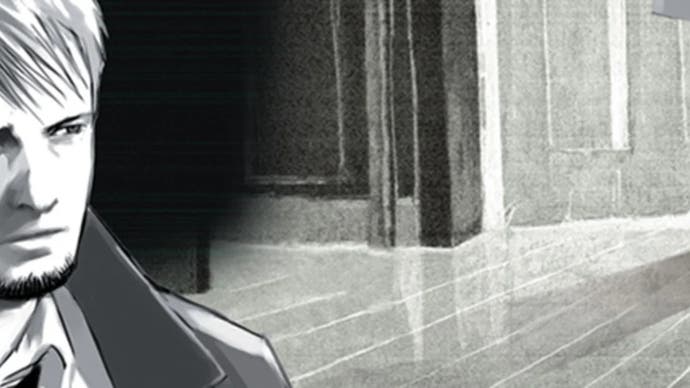Hotel Dusk's ambitions were a perfect fit for the DS
Take on me?
I wish Hotel Dusk: Room 215 was more accessible than it is. It has all the requisite ingredients to become a giant hit. It's a Japanese adventure game with a fantastic localisation, it was released on the Nintendo DS in 2007, at the height of its popularity, and it has a restless sketch-based visual style that immediately makes it stand out. The last decade's seen plenty of similar Nintendo DS adventure games get another chance at life and become wildly successful: Ghost Trick, Phoenix Wright, and the Zero Escape series.
Despite what the PEGI 12 rating on the box art says, Hotel Dusk is aimed at a more mature audience. You play as Kyle Hyde, a former detective who quit the force after killing his partner during a case. This trauma ends up haunting Hyde in every aspect of his life, and daily, he refuses to accept that his partner is really gone. Since leaving the police, Hyde's taken up a job as a door-to-door salesman, but it's his search for answers surrounding his partner's disappearance that brings him to Hotel Dusk.
It sounds intense, but Hotel Dusk isn't entirely doom-laden. It's hilarious when it needs to be, and more than anything, it's a relaxing text-heavy experience. You spend the entirety of the game inside the hotel, and all you do as Hyde is walk around the various rooms, investigate clues, solve puzzles, and have conversations with the hotel's other guests. It might be the least "adventure" ever put into an adventure game. The other residents staying at the Hotel Dusk are equally as complex as Hyde, each holding on to some sort of event in their past that they can't let go of. And as an ex-detective, Hyde can't help himself from getting involved in other people's lives in the first place.
Hyde is a sympathetic character, but I wouldn't go as far as to say he's likeable. He's often rude to strangers unprovoked and, is purposefully withdrawn when talking to most people. But that's exactly why he's such a great protagonist. In some sense, Hotel Dusk is a story about Hyde's own development and growth as a person.
Unfortunately, a remaster of Hotel Dusk is almost likely to never happen. Cing, the developer, filed for bankruptcy in 2010, and the legal rights to Kyle Hyde are locked away safely with Nintendo. Other Cing games have had an afterlife - not least Another Code, which hit the Switch this week. Above all else though, Hotel Dusk took such great advantage of being on the Nintendo DS that any port of the game would inevitably lose something.
The defining thing about Hotel Dusk is that you have to play it sideways. You need to physically rotate the DS in your hand as if you were holding an open book. It's a simple switch-up, but it vastly transforms your relationship with the game. Purely by turning the DS, Hotel Dusk feels less like a piece of software, and instead like an interactive picture book. It feels really natural to read the game's long conversations this way; as each of the two screens show a different character speaking, you can see both sides of a conversation simultaneously as they unfold.
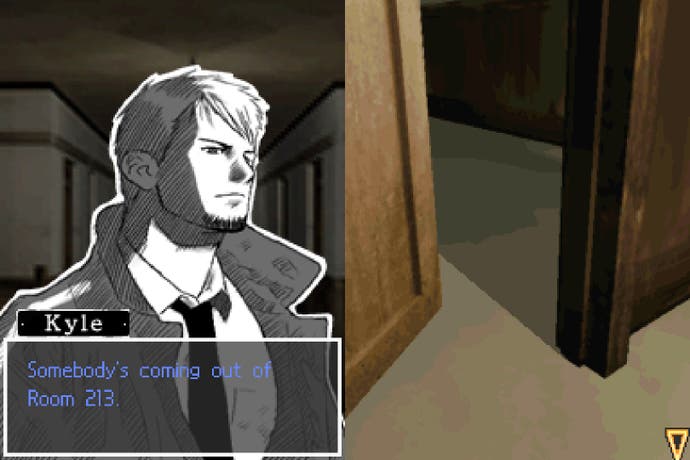
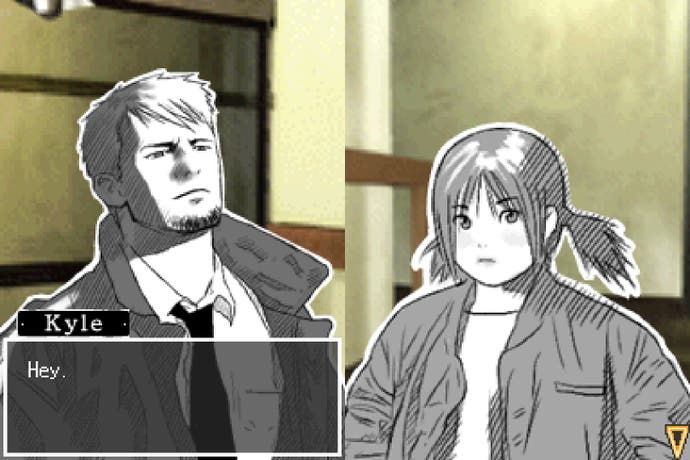
The DS wasn't a particularly powerful device, relative to home consoles anyway. As a result, a lot of DS games used simple 3D graphics, but I think it's fair to say that for an adventure game with a lot of reading--something that heavily relies on visual appeal--going down that route would've been a mistake. Hotel Dusk does use 3D rendering for the interior of the hotel, but it opts to use gorgeous sketchy illustrations for its characters instead.
Something screenshots can't show off is that all of the character portraits in Hotel Dusk are rotoscoped. To achieve the game's unique look, photos and videos were taken of live-action actors and then they were traced by hand, resulting in the game's smoothly animated artstyle. This way, the game's animations capture the energy of a live-action performance while still ending up with the clarity of a drawing. Each character comes across as a convincing person with their own quirks and traits. (A while back, Hotel Dusk's director and character designer Taisuke Kanasaki confirmed that the inspiration behind this was apparently A-ha's Take On Me music video.)
Hotel Dusk is brilliant at pulling you into its world, because it frequently blurs the line between Hyde and the player. Throughout Hotel Dusk, Hyde constantly jots down notes & clues in a journal of his, and as a player, interacting with the game using the DS' stylus has you functionally doing the same. Rather than pushing a button or a stick, the touch screen and stylus force you to make a writing motion with your wrist in order to do just about anything. Even basic actions like walking require an analogue input on the touch screen.
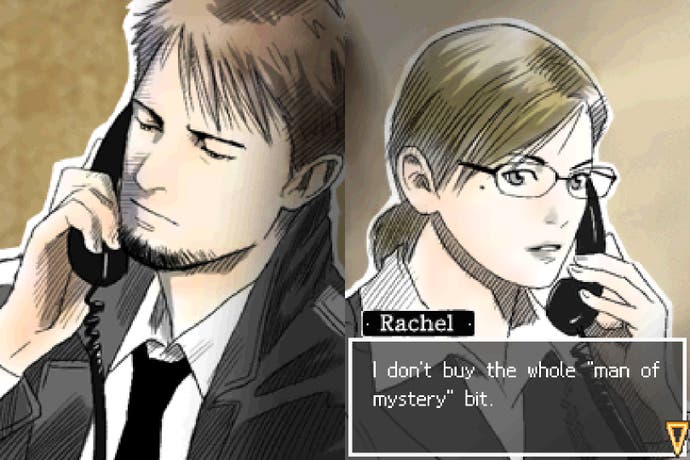
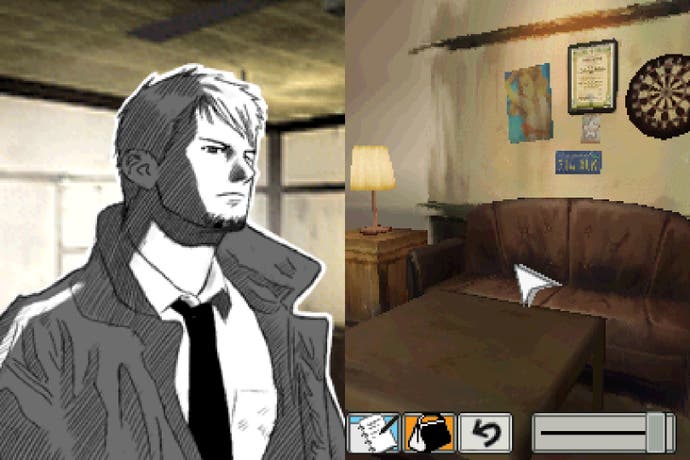
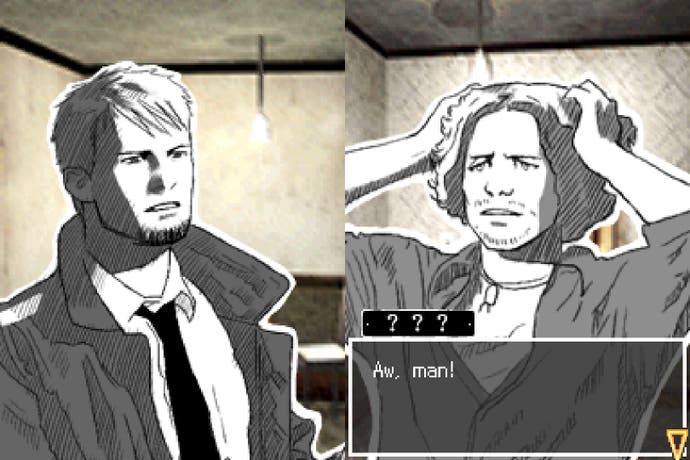
Hotel Dusk's puzzles are another area that forces you to think outside of the box, in some cases literally. One requires you to flip a finished jigsaw puzzle by moving it from the top screen of the Nintendo DS to the bottom. Poking around the screen does nothing. So, what's the solution? You have to physically close the DS to create the illusion of turning the top screen over, and once you re-open the DS, the jigsaw's been turned over. I never figured this out organically. I closed the DS to pause the game because I couldn't think of what to do next, and when I returned and opened the device, I was floored. My actions outside of the game directly affected the world inside it.
Ultimately, the appeal here is not just that Hotel Dusk is this extremely vivid world a person could get lost in. Plenty of games offer that. It's that Hotel Dusk is an extremely vivid world that's also held within the palm of your hand. What you have with Hotel Dusk is a work built from so many brilliant individual pieces, but collectively they leave you with something greater too.
While we might never get a modern port of Hotel Dusk because of, well, everything I just said earlier, the good news is that if any of this sounds remotely appealing to you, Hotel Dusk did get a sequel that built on all of these ideas. It's called Last Window: The Secret of Cape West. And it's sitting fully translated just waiting to be played.
